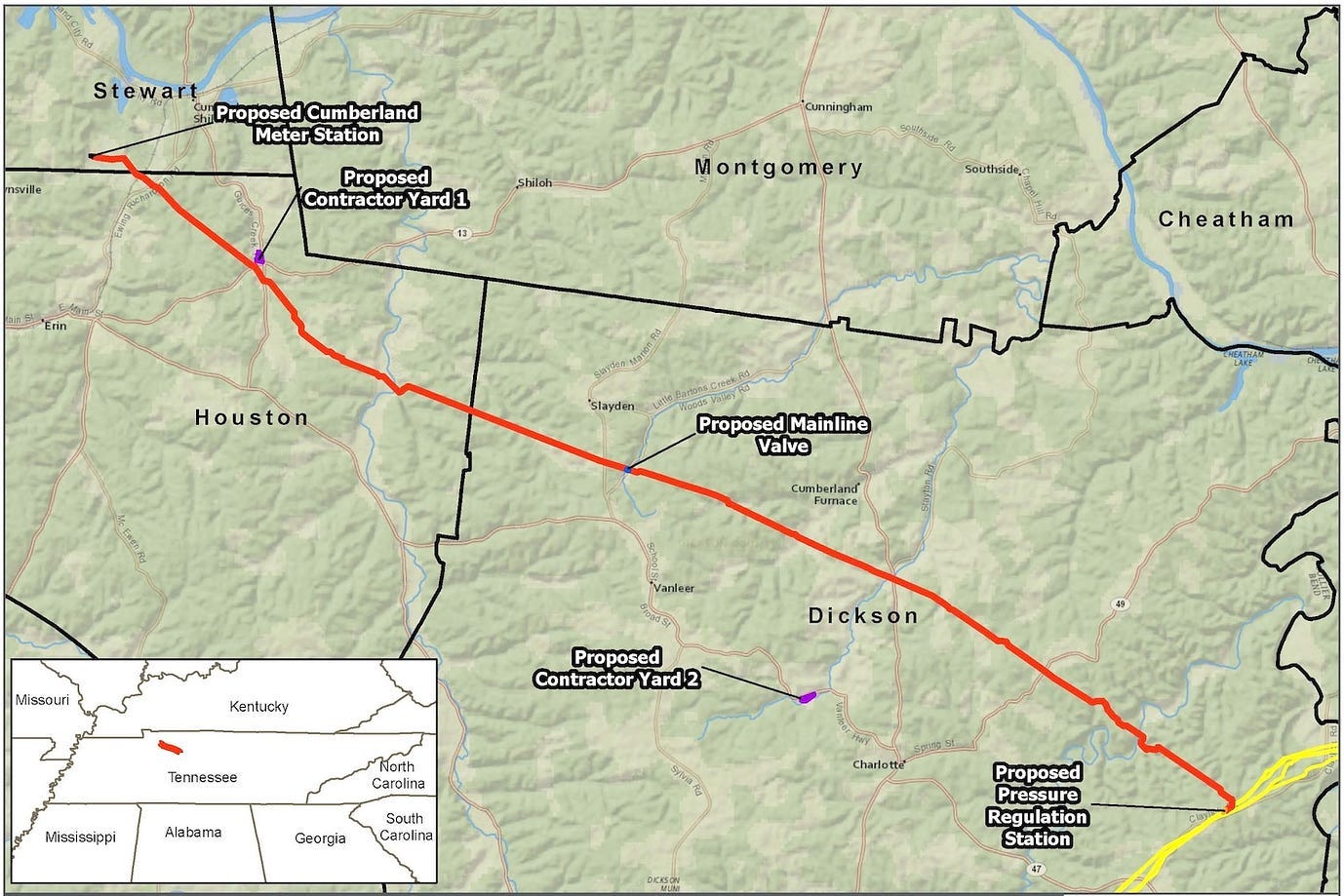“How the Sierra Club and Other Special Interest Shills Are Delaying Critical Infrastructure with the Help of Judges”, By THOMAS J SHEPSTONE
“ This strangulation of our economy and energy security by special interests and a politicized judiciary needs to be halted. Fortunately, well-argued dissents help in that process.”
How the Sierra Club and Other Special Interest Shills Are Delaying Critical Infrastructure with the Help of Judges
OCT 14
An important 32-mile Tennessee Gas Pipeline (TGP) project through multiple Tennessee counties was just put on hold by the U.S. Sixth Circuit of Appeals. It’s called the Cumberland Project and here is the route:
Kinder Morgan, of which TGP is part, describes it as follows:
The Cumberland Project will provide approximately 245,000 dekatherms per day of additional natural gas transportation to the Project shipper, Tennessee Valley Authority (TVA), to support TVA’s proposed retirement and replacement of an existing coal fired power plant with a natural gas fired, combined cycle power plant, subject to the completion of TVA’s environmental reviews and final executive approval of its retirement and replacement project.
The Court by the 2-1 vote of a panel granted a petition by the Sierra Club and an elitist special interest shill group called Appalachian Voices. Jim Willis wrote about the case here and I added background on the disingenuous players. Now, the case has been decided, and the decision revolves around the same water quality certification required of states that New York, for instance, used to thwart projects (e.g, the Constitution Pipeline). This time, though, the State of Tennessee has issued the permit already but just two Federal judges have blocked the project anyway, saying the following:
At this preliminary stage, Petitioners have satisfied their burden with respect to both stay requests. As their requests demonstrate, Petitioners are at risk of considerable irreparable harm should TGP commence Pipeline construction before this Court renders judgment on their Petitions. TDEC [Tennessee Department of Environmental Conservation] and the Corps’ CWA certifications acknowledge the irreparable nature of the Pipeline’s construction. TDEC, in approving TGP’s § 401 application, authorized what it characterized as “permanent impacts” to 0.03 acres of wetland and 490 linear feet of stream.
While these irreparable harms are not dispositive, our analysis at this juncture must give due consideration to the harms which will transpire in the absence of a stay, see “[W]hen a greater showing of irreparable harm in the absence of a stay is made, a lesser showing of the likelihood of success on the merits is necessary to support a stay.” In addition, Petitioners’ contentions concerning the adequacy of the Corps and TDEC’s respective reviews of TGP’s CWA applications “present[] serious questions on the merits,” further buttressing the case for stays at this time.
The two judges, Karen Mary Nelson Moore and Eric Lee Clay, both appointed by Bill Clinton, gave little in the way of good reasons for the stay except to agree the Sierra Club and its shills had raised “serious questions,” which is a polite way of saying the state was less trustworthy than the special interests. Moore is a Senior Judge (semi-retired) and Clay has a history of Democrat political activism prior to going on the court. So, it's hardly surprising this particular panel, which was a result of what can only be described as the bad luck of the draw.
What was good about the draw, though, was that it included Amul R. Thapar, who President Donald J. Trump’s first appellate court nominee. He wrote a strtong dissent to the majority's decision, which may well be reversed as the case is reconsidered or appealed. Here are some relevant excerpts (emphasis added and some citations deleted):
THAPAR, Circuit Judge, dissenting. Environmental groups have asked our court to invalidate two permits—one from Tennessee and one from the Army Corps of Engineers. The permits authorize the Tennessee Gas Pipeline to start constructing a 32-mile pipeline. Before us now are petitioners’ motions to temporarily suspend the permits during the pendency of appeal. The majority grants both stay requests.
But petitioners haven’t shown that we’re likely to have jurisdiction over their state-law arbitrary-and-capricious claim against the Tennessee Department of Environment and Conservation. That means they haven’t shown a likelihood of success on the merits of that claim…
The majority takes petitioners’ request for a “stay” at face value. While we may stay lower court orders or even federal agency actions, an injunction is our only way to stop states from acting. No matter what petitioners call it, an order preventing a state agency decision from taking effect “is an injunction.” So if we want to order TDEC to do something, we must enjoin it—as we would any other litigant.
To obtain a preliminary injunction, a petitioner must establish both a likelihood of success on the merits and irreparable harm absent relief. Winter v. Nat. Res. Def. Council, Inc., 555 U.S. 7, 20 (2008). And just last term, the Supreme Court emphasized that Winter requires petitioners to “make a clear showing” of their likelihood of success on the merits.
So, to stop the TDEC Water Quality Certification permit, Petitioners haven’t shown that they’re likely to succeed on the merits of their claim. Why? In part, because they haven’t shown that our court is likely to have subject-matter jurisdiction. “Federal courts are courts of limited jurisdiction.” A federal court may exercise jurisdiction only when both a statute and the Constitution authorize it. In fact, we must presume that petitioners’ suit “lies outside [the] limited jurisdiction” that we possess.
The burden to overcome this presumption rests with petitioners, since they’re the ones invoking our judicial power. Subject-matter jurisdiction is “relevant to [the] likelihood of success” inquiry. In Arizona v. Biden, various states had obtained a preliminary injunction against the implementation of a federal agency memorandum. On appeal, we reversed the preliminary injunction after holding that the states weren’t likely to succeed on the merits of their claims.
One reason why? We weren’t sure whether the states had Article III standing. Notably, we didn’t resolve the standing question one way or another, even though standing is a question of subject-matter jurisdiction. Instead, we explained that our provisional doubts about standing meant that the states hadn’t established a likelihood of success on the merits. Arizona v. Biden thus teaches that subject-matter jurisdictional issues factor into our likelihood-of-success
Just as in that case, the petitioners here stumble over a subject-matter jurisdictional hurdle in their effort to establish the likelihood of success on the merits. The statutory subject-matter jurisdictional analysis proceeds in two steps.
The first step is to determine whether petitioners’ cause of action comes from state law or federal law. Here, petitioners assert a state-law cause of action. No federal law gives petitioners a right to bring their arbitrary-and-capricious claim against TDEC. Petitioners can’t find a cause of action in the Natural Gas Act, the Clean Water Act, or the Administrative Procedure Act. So their cause of action must come from Tennessee state law.
The second step is to determine whether both a federal statute and the federal Constitution authorize us to exercise jurisdiction over this state-law cause of action. This is where petitioners come up short in their request for preliminary relief. The difficulty? They haven’t demonstrated a likelihood that any federal statute authorizes us to hear their state-law claim against non-diverse parties in federal court. Although petitioners point to a jurisdictional provision of the Natural Gas Act, they don’t explain how that provision satisfies the Supreme Court’s clear-statement rule for federal statutes that effect a significant intrusion on the historical sovereign powers of the states…
Petitioners’ underlying claim is that TDEC acted arbitrarily and capriciously when it granted a water-quality permit to the Tennessee Gas Pipeline. But what statute gives them a right to judicial review of this claim? Not the federal Natural Gas Act. See 15 U.S.C. § 717r(d)(1). That statute doesn’t give petitioners a cause of action to challenge the procedures that a state agency followed in issuing a certificate.
To be sure, the Natural Gas Act contains a provision that purports to vest our court with “original and exclusive jurisdiction” over “any civil action” challenging certain orders of state agencies. More on that below.) But that provision doesn’t give anyone “a right of review,” “specify who can be sued as a defendant,” or “specify a standard of review.” Just like the general federal-question jurisdiction statute, the Natural Gas Act’s jurisdictional provision simply confers authority to hear certain causes of action that “[p]etitioners might otherwise have.” Shrimpers & Fishermen, 968 F.3d at 427 (Oldham, J., concurring).
Nor does the federal Clean Water Act give petitioners a cause of action. To be sure, TDEC issued the challenged order under section 401 of that statute, which requires companies seeking approval of a pipeline to provide the Federal Energy Regulatory Commission with a state-issued water-quality certificate.
And, the Clean Water Act provides a cause of action “against any person” alleged to be in violation of either (a) an effluent standard under that statute or (b) an order issued about such a standard. But that’s not the claim petitioners have brought. They don’t allege that TDEC violated an effluent standard or an order issued about such a standard. Instead, they allege that TDEC violated various administrative procedural requirements, such as the agency’s duty to consider relevant evidence and its duty to explain the conclusions it reached. So while the Clean Water Act does provide a cause of action for some claims to relief, it doesn’t provide one for the type of claim that petitioners advance…
Petitioners’ only cause of action comes from Tennessee’s state administrative procedure act. That statute gives a right of judicial review to anyone “aggrieved by a final decision” of a state agency. It authorizes a reviewing court to remand, reverse, or modify a state agency’s decision if the underlying “administrative findings, inferences, conclusions, or decisions” were “[a]rbitrary or capricious or characterized by abuse of discretion or clearly unwarranted exercise of discretion.” This is exactly the type of claim petitioners are advancing. Thus, it is this Tennessee law—not the federal APA, or any other federal statute—that gives petitioners a right to judicial review of their claim that TDEC acted arbitrarily and capriciously…
Finally, even if petitioners could show that the Natural Gas Act gives us statutory subject- matter jurisdiction over “a purely state-law dispute,” petitioners would still “run headlong into a constitutional question.” Regardless of whether a statute purports to authorize jurisdiction, federal courts can only hear cases that fall within the “judicial Power” of the United States…
And petitioners haven’t even argued, let alone convinced us, that they would prevail. In sum, the constitutional issue provides yet another reason to doubt that petitioners are likely to succeed on the merits of their underlying claims…
In light of these unresolved questions, petitioners haven’t established that they are likely to succeed on the merits of their claims…
Judge Thapar's dissent is a very thoughtful one. It highlights the yet unresolved problems with water quality certification related to critical natural gas infrastructure. It also lays some groundwork for a resolution a few months from now. Meanwhile, though, the Sierra Club and its shills have forced unnecessary delays and costs opn pipeline infrastructure needed to build a power plant. This strangulation of our economy and energy security by special interests and a politicized judiciary needs to be halted. Fortunately, well-argued dissents help in that process.
#SixthCircuit #Trump #Judges #TennesseeGasPipeline #KinderMorgan #SierraClub #AppalchianVoices #TVA #NaturalGas #Pipelines #CumberlandProject







